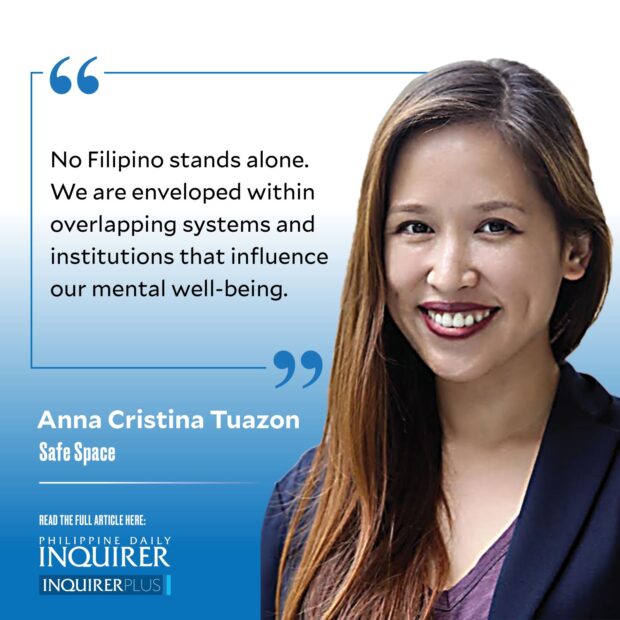A socially just therapy

We reached a point in our graduate psychotherapy class when we learned about social justice therapy. I have been looking forward to this module as I finally had the space to reintroduce it after three years of shortened semesters due to the pandemic. Psychotherapy has long been criticized as being too focused on the individual and assuming that the individual just needs to develop enough resilience to be able to overcome their problems. The social justice lens puts broader social contexts front and center in the therapeutic encounter. We integrate power dynamics into how we understand our clients. This approach also forces the therapist to reckon with their own privilege, experiences with power, as well as their own norms and biases.
This cannot be more appropriate in the Filipino context. No Filipino stands alone. We are enveloped within overlapping systems and institutions that influence our mental well-being. The average Filipino in Metro Manila spends hours in congested traffic to go to jobs that barely pay for their daily expenses. We are notorious for our inexplicably slow lines. What should take only minutes end up taking half a day, if not more, making it impossible to squeeze in our errands during our work breaks. The average Filipino ends up having to take precious time off work — and go without pay — just to attend to necessary government transactions like National Bureau of Investigation clearance, driver’s license, etc. The same goes if you need to go to a bank. Lack of convenience has become the Filipino way of life.
These hardships barely allow Filipinos the time and energy for self-care. One undeniable fact about stress is that it is heavily correlated with the amount and severity of external stressors. We can employ meditation, exercise, and healthy eating to combat stress. But the most effective way to reduce it? By minimizing your external stressors to begin with. Easier said than done!
The social justice approach concerns itself with how much you are able to wield control over your external stressors in the first place. One of the things I warn my students against is to be flippant about giving advice such as “If you don’t like your job, then quit.” This advice assumes that the client has the privilege and resources to find another job. Even the ability to prioritize one’s mental health is a privilege. Most Filipinos expend majority of their mental resources into securing their basic needs such as food and housing. If they refuse to go seek professional mental help, it is not that they are merely “resistant.” Sometimes — perhaps most of the time — it is because they could hardly afford it. If they can no longer process other’s emotions or regulate their own, it is perhaps because they have no more energy left to attend to these concerns. Our external realities very much matter in mental health.
So what does social justice therapy propose? It encourages therapists to become advocates for their clients and communities. We go beyond the therapy room to facilitate much-needed change in our client’s lives. For example, we advocate for our clients’ accommodations at school or work. We advocate for their rights within the family by working with their parents and family members.
We can also advocate for their rights within society by providing psychoeducation to the relevant sectors and institutions. Psychologists have served as resources for draft legislation and have consulted for policies. Psychological organizations have put out position papers as needed, such as when child rights and other human rights were involved.
A student asked me how come they don’t notice psychologists becoming active in politics, given that people’s social realities affect their well-being. I relayed the concerns of some psychologists about retaining a neutral stance so as to continue being of help to as many clients as possible, fearing that advocating for certain issues can lead to client alienation. At the same time, I shared my experience that I have been able to work clinically with folks who hold differing beliefs from me in a way where I don’t have to pretend to be someone I’m not. In fact, the experience of having someone state their stance and still be willing to help you can be a corrective experience for some clients. Just because we are different doesn’t mean we stop caring. At the same time, the therapeutic relationship can allow the client—and therapist—to reflect on their stance and mature it, becoming more empathic and compassionate.
Psychologists and mental health professionals should not be afraid to go beyond their individual consults. We need to make sure that we are providing psychological perspectives to pressing issues that affect people’s well-being. Therapy can be both life-changing and society-changing.




















